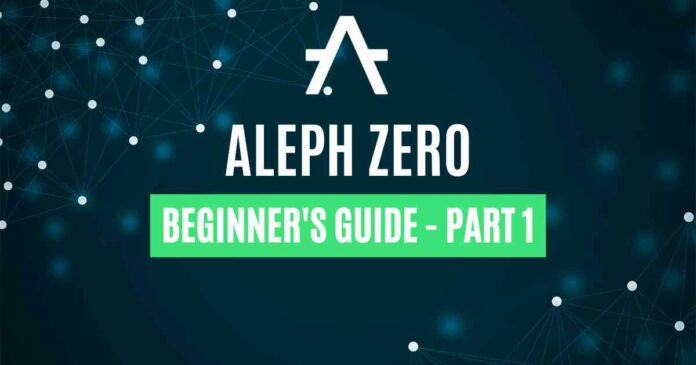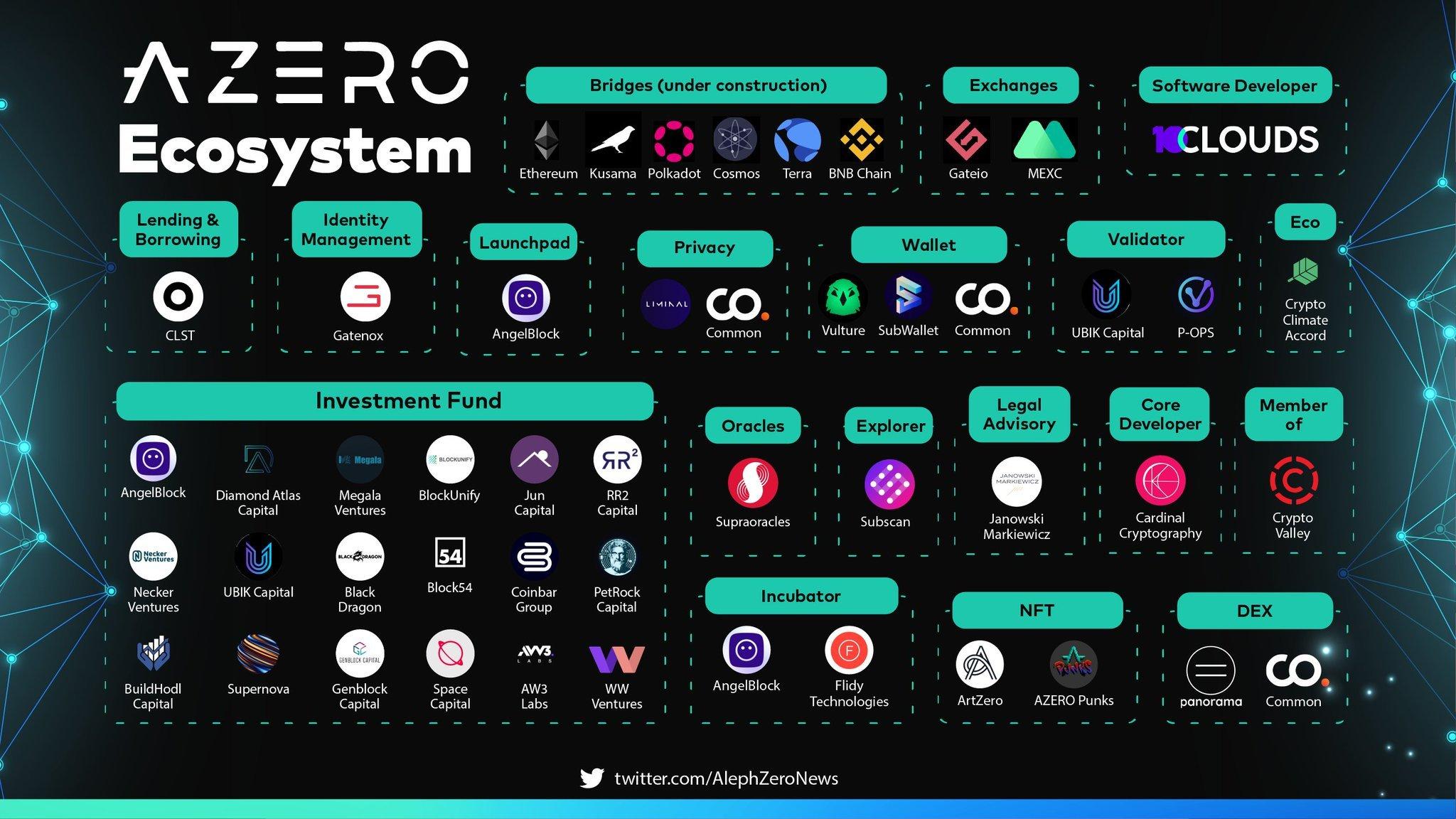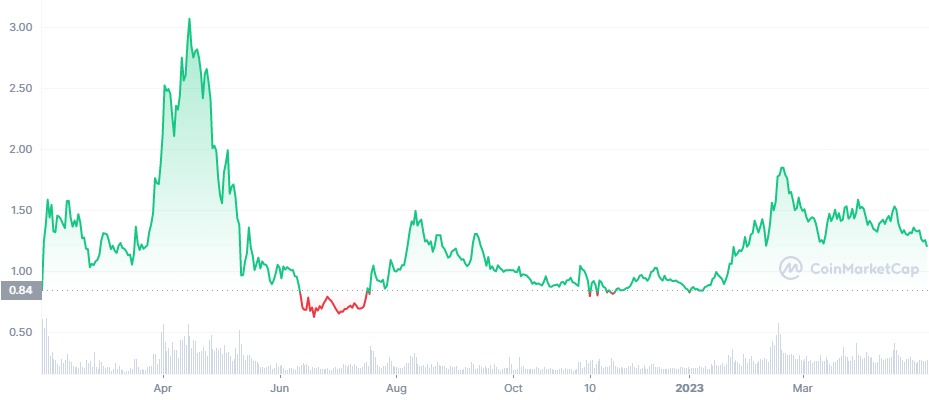Solving the critical features encompassed by the blockchain trilemma – security, decentralization, and scalability – within a lone chain presents a formidable challenge. While numerous projects have worked tirelessly to create a blockchain that satisfies all three aspects, finding a solution that checks all the boxes remains a daunting task.
In this article, we’ll explore Aleph Zero, a blockchain project that has been gaining attention for its potential to crack the trilemma.
What is Aleph Zero?
Aleph Zero is an enterprise-oriented blockchain platform renowned for its exceptional performance. Based on a Directed Acyclic Graph (DAG), its consensus mechanism has undergone rigorous peer review.
Introducing the Ecosystem Funding Program! 🎇
It's a holistic initiative designed to support Aleph Zero builders through grants, incubation, acceleration, and more, with a $50m pool of initial resources.
👀Dive deeper: https://t.co/mRGfT0swK8
🫵Apply: https://t.co/BDY5hZncO8 pic.twitter.com/UMKCOry8us
— Aleph Zero (@Aleph__Zero) April 18, 2023
Moreover, the team has even presented it at an ACM conference. Interesting, right? With secured $15 million in funding, Aleph Zero is dedicated to advancing its technology, integrating with the Substrate stack, and expanding its team. Its core mission is to introduce Liminal, a privacy layer leveraging cutting-edge methods like secure multi-party computation and zero-knowledge proofs.
Essentially, the goal is to enable small and medium-sized enterprises to communicate with regular internet speed while safeguarding their privacy.
Aleph Zero is Addressing Challenges in Blockchains
Aleph Zero aims to address the challenges blockchains face concerning security, scalability, decentralization, privacy, and user and developer experience.
With Aleph Zero, you get instant finality and highly efficient scaling capabilities at both the consensus protocol and smart contract levels- ensuring the network can handle a vast number of users, making it suitable for a wide range of on-chain use cases.
Moreover, one of Aleph Zero’s primary goals is to achieve a decentralized system– one where no single node holds power to control the sequence of units during the operation.
But how?
1) AlephBFT
At the heart of the Aleph Zero is the AlephBFT consensus protocol, which provides maximum theoretical security guarantees. By utilizing Byzantine Fault Tolerance (BFT), Aleph Zero ensures that communication between network nodes remains effective and transparent, even in the presence of malicious nodes.
As the week passes by, here's what we accomplished since the last update! ✅
If you want to give a go to the ink! wrapper, you'll find it here: https://t.co/RR3kfT3kR1
Looking forward to your feedback on this tool! pic.twitter.com/ceMGf5o2ur
— Aleph Zero (@Aleph__Zero) May 4, 2023
Essentially, BFT consensus models operate under the assumption that less than one-third of the nodes within a network are acting in bad faith. This protocol allows the network to withstand up to 33% of malicious committee members without compromising the validation process.
Therefore, the network confirms the transactions once 67% of the members reach an agreement on them. What’s more, the Aleph Zero network boasts an asynchronicity trait. This feature ensures that all legitimate transactions are confirmed without relying on any timing assumptions, even when the network is entirely asynchronous.
This setup provides distributed denial of service resilience and easy protocol recovery following network partitions.
Azero Use Cases
Aleph Zero’s use cases span various applications, from IoT and supply chain management to virtual game assets, decentralized domain name systems, and even automatic tax payments.
Source: Twitter
These varied applications showcase how we can leverage blockchain to streamline and enhance diverse aspects of daily life.
A prime example is its smart contract tech, which is fast and secure, capable of supporting high-computing applications. It opens new opportunities for complex systems incorporating machine learning components and other high-scale automated services.
The possibilities for this technology are vast, but unlocking them requires running smart contracts on a decentralized network that can deliver real-world performance.
Thankfully, Aleph Zero’s smart contract technology does just that. It has the potential to usher in a new era of decentralized applications that can achieve previously impossible levels of performance and functionality.
Let’s explore!
1. Automatic Payments and Shared Revenue Agreement
Aleph Zero can revolutionize revenue-sharing models by facilitating transparency and efficiency, reducing the need for audits and trust. Moreover, the platform can simplify agreement-making by providing a user-friendly interface for parties to create smart contracts based on their specific terms.
Once the parties agree, they can generate a smart contract for a specified duration and begin receiving mutual benefits with minimal additional effort.
2. Wallet & DEX
The Common Wallet, a decentralized wallet proposed by Aleph Zero, can work with various cryptocurrencies, including Bitcoin and Ethereum.
Furthermore, being a Directed Acyclic Graph (DAG), Aleph Zero operates without relying on mining and offers minimal transaction fees.
Its decentralized security ensures trustlessness, while its fast speed enables near-instant transactions. These features make Aleph Zero well-suited for creating decentralized exchanges that can handle high volumes of cryptocurrency trading at scale.
The developer portal is here! 🌟
Access this one-stop shop for everything you need to start building on Aleph Zero and @ink_lang.
Visit https://t.co/JYf00QGswJ! 🫵 pic.twitter.com/wDF51sUx0h
— Aleph Zero (@Aleph__Zero) April 13, 2023
3. Supply chain management
Aleph Zero can offer solutions to various challenges faced by supply chains. One of the significant issues it can address is simplifying payments and accounting through a token stored on the Aleph Zero protocol. Furthermore, it can:
- Create a fast and reliable distributed record by incorporating the complete history of production, logistics, and distribution into the Aleph Zero network.
- It would enable tracking of products from the point of sale to their origin, encouraging companies to demonstrate transparency in their practices.
With such transparency, consumers can verify the authenticity and quality of products, while companies can improve accountability and efficiency in their supply chain management.
4. Notary signatory
An alternative approach to traditional notary public services is to employ online video calls that are recorded and stored on a secure and decentralized ledger. This approach provides easy access to transaction information and the parties’ identities.
Aleph Zero, image recognition, artificial intelligence, and similar technologies can replace notary publics with a secure system. As such, this system would offer a feasible and more efficient option for individuals and organizations to validate the authenticity of legal documents without needing a physical presence.
5. DNS
Aleph Zero has the potential to serve as the foundation for a fully decentralized domain name system (DNS) integrated into web browsers. Essentially, it could establish a trustworthy technology layer for the internet, eliminating the possibility of malicious manipulation of the end IP address on the DNS side.
Besides, it would also remove the need for website certification to attest to their legitimacy or the requirement for encrypted connections. Moreover, retention of connection details is absent, improving privacy.
Furthermore, Aleph Zero can expedite connections in contrast to traditional DNS servers, resulting in faster browsing experiences. This innovation could revolutionize the internet by ensuring trust and privacy while delivering speedier browsing speeds.
.@mike1third from @AZERODomains and @scio_xyz sharing his experiences on participating in the Aleph Zero EFP so far. Thank you for this valuable feedback! https://t.co/iieZezZ71z
— Aleph Zero (@Aleph__Zero) April 20, 2023
6. Asset digitization
Aleph Zero’s smart contract functionality can reduce much of the paperwork, streamlining transactions and guaranteeing the process’s integrity. By leveraging smart contracts, Aleph Zero can automate the exchange of assets, eliminating the need for intermediaries and reducing transaction costs. As such, this results in faster and more secure transaction executions with greater efficiency.
7. Game assets
By leveraging Aleph Zero’s decentralized architecture, virtual game assets can be managed securely and efficiently, promoting trust and transparency in the gaming industry. Furthermore, its interoperability ensures players can easily exchange their assets without negatively impacting the gaming experience.
8. Transparent Public Document Access
Aleph Zero provides a solution that can balance transparency and privacy. For instance, it can reduce paperwork, simplify compliance, and bring about novel advancements, such as algorithmic laws that can keep up with the pace of evolving technologies.
9. Databases
As distributed ledgers are less vulnerable to cyber-attacks, businesses can enjoy enhanced security by migrating traditional databases to Aleph Zero’s decentralized platform. Also, Aleph Zero’s interoperability allows for seamless integration across different chains- whether private or public.
Ultimately, with Aleph Zero, businesses have the potential for minimal-fee decentralized databases that could be highly advantageous to their owners.
10. Automatic Tax Payment
The platform’s public ledger and smart contract capabilities enable automated and accurate tax calculations and payments, making cross-border VAT settlements seamless. It could eliminate the need for traditional accounting practices or, at the very least, the need to issue invoices.
11. IoT
By integrating with IoT networks and leveraging the open-source community, Aleph Zero can facilitate collaborative contributions toward creating effective solutions that cater to various devices.
How to buy AZERO?
The following exchanges currently list AZERO coins:
Source: CoinMarketCap
Here are the steps to purchase and store AZERO coins:
- Set up an AZERO wallet: Choose a wallet like Talisman, SubWallet, or Nova that supports AZERO coins. Follow the instructions to create your wallet.
- Create an account with an exchange: Choose a EX that supports AZERO coins and allows purchases and trading in your country. Set up an account and complete the identity verification process.
- Deposit funds: Deposit fiat currency or a cryptocurrency into your exchange account to facilitate your purchase.
- Buy AZERO coins: Go to the buy feature on the exchange and enter the number of AZERO tokens you want to purchase. Complete the purchase and wait for the CEX to send your digital assets.
- Transfer to your AZERO wallet: Once you receive the coins, withdraw them by pasting the address of your AZERO wallet. It will move your tokens from the exchange to your wallet.
- Staking or holding: You can now stake or hold your coins in your wallet for future use.
Following these steps, you can easily purchase and store AZERO tokens securely in your wallet.
Conclusion
In conclusion, Aleph Zero is a next-generation blockchain ecosystem that offers numerous advantages over traditional blockchains, such as improved speed, scalability, security, and interoperability.
It has the potential to revolutionize various industries, from finance and governance to gaming and IoT, by facilitating efficient asset exchange, enhancing security, and enabling faster transactions.
With its flexibility allowing for both public and private environments, Aleph Zero is an ideal solution for countless use cases.
It will be exciting to see how Aleph Zero will continue to evolve and shape the future of Web3. Read the second part here.
⬆️ For more cryptocurrency news, check out the Altcoin Buzz YouTube channel.
⬆️ Our popular Altcoin Buzz Access group generates tons of alpha for our subscribers. And for a limited time, it’s Free. Click the link and join the conversation today.






























